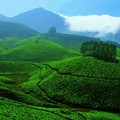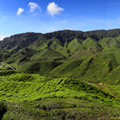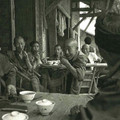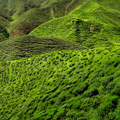Quotes - Experiencing tea
„Mr. Gao showed us how to identify gu shu (ancient tree) tea leaves by looking at their texture, rubbing them between your fingers, and eating them raw. Old tea trees produce thicker, more leathery leaves that don’t easily come apart when you rub them. And gu shu buds should be white & shiny. When you chew them, the flavor is very bitter but there is also a strong sweet fragrance, and the juice is relatively easy to swallow. Tai di cha (terrace plantation tea) is also bitter but with a strong, lasting astringency on the sides & front of the tongue, and the juice is harder to swallow.“

Quotes Tags: Pu-erh, Gushu, Tea production, Experiencing tea
„I found my early blogging efforts, basically writing down my impressions of the tea I drank every day, to be a worthwhile exercise – it helps me process what I’ve had and what I thought, and once in a while I go back to my own ideas back then and realize how I have developed as a drinker, as well as how a tea may have changed over time. Many of my earlier perceptions are flawed, if not outright wrong, or at least have been modified over time by my experiences since then. Writing about it constantly here helps me work through those thoughts.“
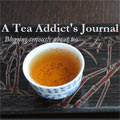
Quotes Tags: Experiencing tea, Pu-erh, Oolong
„Tea learning is, at the end of the day, a solitary experience. No one knows what you’re tasting, so no one but you can teach yourself.“

Quotes Tags: Experiencing tea, Pu-erh, Oolong
„The important thing of all this tea drinking and learning is not so much the drinking itself, but the critical reflection and evaluation that takes place simultaneously. Forget about what others tell you – what do you feel and think when you’re drinking this tea? How does it compare with what you have tried? How does it challenge what you already think you know?“

Quotes Tags: Experiencing tea, Pu-erh, Oolong
„Or perhaps you experiment with different parameters, water, ware, etc. and notice that it performs differently under different circumstances. This type of knowledge is not possible if you only have 25g of a tea. It can really only come with drinking 200, 300, or even 1000g of the same tea.“

Quotes Tags: Experiencing tea, Pu-erh, Oolong
„There is also knowledge that you can gain from drinking the same tea over and over again that you cannot from sampling. This may involve the tea changing on you – a traditionally stored puerh gradually losing its storage taste, for example. Or, it can just be that you start noticing nuances that were there, but were not necessarily obvious the first few times you try it.“

Quotes Tags: Experiencing tea, Pu-erh, Oolong
„In some ways, by doing so you’re basically cupping the tea without cupping it – you’re testing whether or not the tea is good for your style of brewing. Even then, however, a good tea drinker should be adjusting to the tea and trying to brew it as best s/he can, which means that the first try can come out horribly wrong.“

Quotes Tags: Experiencing tea, Pu-erh, Oolong
„What instead happens is that some teas require multiple tastings to reveal themselves one way or another. Sometimes the first time you brew a tea it doesn’t come out quite right not because it’s bad, but because you are still adjusting to it. It helps when you’re using the same teawares all the time, so that the only variable is the tea“

Quotes Tags: Experiencing tea, Pu-erh, Oolong
„Then there is the more nuanced problem of what to do with the samples. It’s quite easy to say that sampling widely will give you experience in tea drinking. In practice, however, that’s not so simple. Of course, trying all kinds of teas will most certainly give you experience. However, it is experience on a relatively shallow level. Certain kinds of teas, such as really bad or really good teas, will probably manifest themselves quite readily. Others, however, are not so obvious. It is actually easier to try teas if you, say, cup them, but then it becomes work and the process is not very enjoyable. This is, ultimately, a hobby, and not a job (for me anyway) so taking the fun away like that is basically missing the point.“

Quotes Tags: Experiencing tea, Pu-erh, Oolong
„One of the things I often advocate for newcomers to tea drinking is to sample widely. Learning about tea is, on some level, not very difficult at all. It requires experience and an active mind to reflect upon and learn from the experiences gained. To gather this experience though, the only way to really do it is to drink a lot of tea. Reading about it or hearing about it really doesn’t do much good, for it is only theory that lacks backing from practical experiences.“

Quotes Tags: Experiencing tea, Pu-erh, Oolong
„You can’t know what is good without knowing what is bad, just like you can’t be aware of the range of possible tastes among shuixian if all you’ve had are light roasted ones. Sampling is about broadening horizons, and it is a low risk way to stretch into areas that you might not be familiar with.“

Quotes Tags: Experiencing tea, Pu-erh, Oolong
„life’s too short to be drinking bad tea“

Quotes Tags: Experiencing tea, Pu-erh, Oolong
„Most of the meditation techniques are using the very same principles we need to perform a good gongfu cha: calm, concentration and a ritual. No wonder we can achieve a very similar outcome! Under good conditions, what emerges is our real Me, speaking from the bottom of our heart. We become the Chinese ideal, a zhen ren, a true man (or woman). We have no needs, no desire. We are fulfilled with the simple happiness of a cup of tea.“
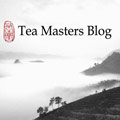
Quotes Tags: Experiencing tea, Tea infusion, Tea infusion, Tao, Tea infusion
„To master the skill of gongfu cha, one needs all his senses and a great amount of concentration. As we gain experience, our movements become more automatic, like rituals. We can brew tea without really thinking, like we drive our car. In a calm setting, our mind is focused on the tea we brew. The choice of a good tea, the harmony of the tea set we use, the way we beautifully arrange the tea table... everything heightens our concentration and peace of mind.“

Quotes Tags: Experiencing tea, Tea infusion, Tao
„Beyond the senses, tea is also a cultural and spiritual pleasure that can open the doors to many other areas. “

Quotes Tags: Tea infusion, Experiencing tea
„Hearing:
It's the sound of soon to boil water, and then the flowing in the gaibei and the cups. It's also the sound of tea bags, of porcelain. And then it's the sound of silence during the tasting...“

Quotes Tags: Tea infusion, Experiencing tea
„Touch:
You, the person brewing the tea is entitled to touch the tea leaves with (clean) hands. What does this contact tell you about the tea? (For me, a 'heavy', compact leave is a sign for a good quality tea.)
Then there is the pleasure of touching the porcelain and to feel it in your mouth. Do you notice how a cup with a different shape will change the taste and pleasure of the tea? And can you find which cup is best for your tea (I tend to prefer old and thin cups).“

Quotes Tags: Tea infusion, Experiencing tea
„Taste:
Sweet: on the tip of the tongue. Lingering mellow taste: How does it evolve over time? Acidity/astringency: on the back and on the sides of the tongue. What defect does the tea have? Yun/cloudiness: How is the finish? Are there any special feelings after the tea has left your mouth? Dry feeling: do you experience dryness in the mouth and throat?“

Quotes Tags: Tea infusion, Experiencing tea
„Smell:
The hot tea leaves: after pouring the tea from the gaibei. Again, a different smell! You can also smell the empty gaibei: a strong smell means that the leaves could have been brewed a few more times.
The empty cup: you can use it as a wen xiang bei! The empty pitcher can also be used as a big wen xiang bei!“

Quotes Tags: Tea infusion, Experiencing tea
„Smell:
Dry leaves: smell the leaves before you brew them. You can smell them before and after you put them in the heated gaiwan.
The gaibei's lid: lots of fragrant smells accumulate below the lid. Smell and you'll know when the tea is ready. You can also smell it after you pour the tea out.
The tea: interestingly, the brew doesn't smell as strong as the lid or the empty glass!“

Quotes Tags: Tea infusion, Experiencing tea
„Sight:
Shape of dry leaves: Put the leaves you intend to brew on a small plate or in a tea cup. Then look at the leaves, their color, their shape...
Color of the tea (in the cup): Is this a beautiful, lively color?
Clarity of the tea: How shiny, how pure is the tea brew? “

Quotes Tags: Tea infusion, Experiencing tea
„Gongfu cha is an interactive pleasure for our 5 senses.“

Quotes Tags: Tea infusion, Experiencing tea
„Smoothness, Softness and Character of Puer Tea
Puerh tea is a type of post-fermented tea. When stored in the correct environment the tea, over time will change, hence - post-fermented. Due to this, the bitterness and astringency will slowly transform. The flavour will soften, become more mellow, rich, the character will become more rounded and mature.“

Quotes Tags: Pu-erh, Experiencing tea
„The Sweetness of Tea
When one sips Raw Puerh tea it should very quickly turn sweet in the mouth. The stronger, more long lasting, more even the flavour, the better the tea.“

Quotes Tags: Pu-erh, Experiencing tea
„Fragrance
Broad leaf variety old tree tea aromas can generally be divided into the following;
fruit-flower fragrance, honey-flower fragrance , honey-sweet fragrance, date-jujube fragrance, orchid flower fragrance , camphor fragrance, sticky rice fragrance , lotus flower fragrance , mellow-aged fragrance
Some teas are highly fragrant, others have refined and prolonged fragrance. Although there are many different kinds of fragrance, they should all be natural, smooth and easy to get a feeling for. These fragrances appear when the tea is drunk and are not evident when smelling the tea.“

Quotes Tags: Pu-erh, Experiencing tea
„Astringency
Astringency invariably accompanies bitterness. In some Puer the astringency is more pronounced, the bitterness slightly weaker. A benefit of astringency is that it can help promote salivation. If this is felt on the underside of the the tongue it is a further mark of good tea.“

Quotes Tags: Pu-erh, Experiencing tea
„Bitterness
Broad leaf variety (Sinenesis Assamica) is high in natural constituents; polyphenols, caffeine,theine, etc. A particularly bitter flavour is a special characteristic of the Broad leaf variety, but it is important that it transforms quickly and does not linger. This is a mark of good quality Puer. NB there is a sub-variety in Yunnan - Var. ku cha which has different characteristics and does not transform in the same way.“

Quotes Tags: Pu-erh, Experiencing tea
„Fishy, Mouldy and Dry Flavours
All one's sense organs can be used in assessing tea, but Fishy, Mouldy and Dry Flavours it should be smelled and tasted. Most problems that arise are related to poor quality tea or poor storage. “

Quotes Tags: Pu-erh, Experiencing tea
„Sourness in Raw Puer is due mostly to inadequate airing after the rolling process or, after pressing tea into cakes, they have been immediately exposed to the sun. The tea soup will likely be turbid.“

Quotes Tags: Pu-erh, Experiencing tea
„Tea that is picked in the summer, often referred to as Yu Shui Cha, is not of high quality. In the rainy season, levels of sunshine are comparatively low so it is often not possible to sun dry tea so a wood stove is used to dry it. This can produce a smokey aroma and flavour. With time it will abate, but not considerably, so any smokey tea that one has not witnessed being made is probably best put to one side.“

Quotes Tags: Pu-erh, Experiencing tea
„Smokiness
The art of making tea from ancient tea trees is very old. Hand-roasting is not easily mastered. Any slight error will influence the taste of the tea. Smokiness or yan wei is one example but it should be distinguished from a burned flavour which is described as hu wei. The latter, typically arises when tea is not well roasted and is, unfortunately, not uncommon. Yan wei or smokiness is caused by oven drying. “

Quotes Tags: Pu-erh, Experiencing tea
„The best test is if, when drinking tea, there are any of prickling, tingling, numbing sensations on or near the tip of the tongue. If this is so one can be reasonably certain that agro-chemicals are present.“

Quotes Tags: Pu-erh, Experiencing tea
„Prickling, Tingling, Numbing
Ancient tea trees are all over 100 years old. Their ability to resist natural problems; diseases and infestations is high. This variety of tea tree has existed in this habitat for thousands of years. These trees are already extremely resilient and the environment in which they are growing has mostly been left in untouched. There is no need for tea farmers to use agro-chemicals. But where any such chemicals have been used it will likely take 7-10 years for the residues to abate sufficiently for the tea to be drinkable.“

Quotes Tags: Pu-erh, Experiencing tea
„Closer Examination of Puer
High quality broad leaf variety tea (camelia sinensis assamica) should not produce any uncomfortable effects such as prickling, tingling or numbing. Nor should there be any errant aromas or flavours such as smokiness, sourness, mouldiness, dry or drying sensations. “

Quotes Tags: Pu-erh, Experiencing tea
„The Appearance of Tea
The appearance of dry tea leaves is affected by the form, be it loose, cake, brick, bowl and so on, how much sunlight the leaves have absorbed, the production methods, etc.
If the leaves appear dried out, lifeless or impoverished in some way it is an indicator that there has been a problem with the production or storage of the tea.
Also, picking over the leaves, they should look plump, fertile, with an appearance of abundance. The tips should be delicate with distinct hairs on the leaves and a uniformity to the overall appearance. “

Quotes Tags: Pu-erh, Experiencing tea
„Again, when tasting the tea, if there is any odd or un-natural smell one might well desist from drinking it.“

Quotes Tags: Pu-erh, Experiencing tea
„Indistinct fragrance is, by nature, restrained, hidden and it is only by steeping the tea and then smelling a cup that has just been emptied of tea can one appreciate this fragrance. Alternatively, one can also smell the steeped leaves. “

Quotes Tags: Pu-erh, Experiencing tea
„If, when smelling tea there is any strange or unpleasant smell, one may well consider not proceeding further to tasting the tea as it will likely not be satisfactory“

Quotes Tags: Pu-erh, Experiencing tea
„Good quality old tea has a 'matured' fragrance (chen wei). This comes from tea that has been stored well and matured without any adverse effects. (xing wei - a 'fishy' smell that can be detected in old tea that has been stored poorly - should be clearly distinguished from chen wei which is quite different). “

Quotes Tags: Pu-erh, Experiencing tea
„The Fragrance of Tea
For the main, Puerh fragrances can be divided into two kinds; distinct and indistinct or explicit and implicit. The Distinct fragrance of Raw Puerh tea is immediately obvious as a delicate, bright fragrance; a fresh, crisp aroma that is uplifting“

Quotes Tags: Pu-erh, Experiencing tea
„In the Western market, tea drinkers often end up buying a few pots in the beginning that don’t quite “fit.”
Maybe the size is wrong, the clay is poor, or is simply not a match to any of our desired teas. Perhaps the shape and craftsmanship are just not pleasing to us.
Owning bad teapots, experienced collectors will remind you, is “tuition” that helps you start to recognize better teapots from the others.“
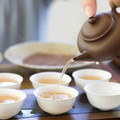
Quotes Tags: Pu-erh, Tea infusion, Experiencing tea
„Some more obvious manifestations of cha qi are a heating or cooling of the extremities (eg, sweaty palms when drinking a ‘warming’ tea like aged puerh or heavily roasted oolong), a flushing of the face, or a measurable change in mood. In a small group, tea can either lead to deep conversation, giddy laughter, or contemplative silence.“
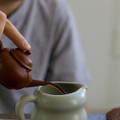
Quotes Tags: Pu-erh, Experiencing tea
„Possibly the most nebulous of tea’s qualities are ascribed to 茶氣 [chá qì] — a tea’s “energy.” Most readers will probably be familiar with at least some of the wide ranging effects it is attributed with. Practically any physical or mental stimulus outside of the mouth, nose, and throat falls into the realm of cha qi.“

Quotes Tags: Pu-erh, Experiencing tea
„The next place to focus is feeling in the throat. Tea here can be cooling or warming, rough or wet. Often drinking good tea will give you the sensation of a ball in your throat. It is good to consider how far down the tea goes — in other words, where the sensation is no longer apparent. If the tea slips down without any notice, it is just a drink. Many good teas will stop somewhere in the middle of your throat. If it gives a pleasant feeling all the way down to your core, it is truly something special.“

Quotes Tags: Pu-erh, Experiencing tea
„After initial taste and aroma, the first thing tea drinkers are likely to focus on is known in Chinese as 回甘 [huí gān]. In English, a near literal translation is “Returning Sweetness,” but we can think of this loosely as aftertaste. You can experience this clearly in most good teas, and probably already have. In the best teas, though, the taste can go on for hours.“

Quotes Tags: Pu-erh, Experiencing tea
„zhang wei; 樟味 - Camphor flavour. This is sometimes present in old tea tree Puer. Due, it is said, to the presence of Camphor Laurels in tea gardens where they were planted as a form of natural pest control. “

Quotes Tags: China, Experiencing tea, Pu-erh
„yun; 韵. Charm, appeal, allure. A difficult term to render into English as it refers to a quality of tea that 'cannot be apprehended by the five senses.' Generally used with hou; 喉 - throat. Hou yun. A pleasant feeling that lingers in the throat after swallowing tea. Distinct from hui-gan. “

Quotes Tags: China, Experiencing tea, Pu-erh
„tian xiang; 甜香 - 甜, tian - sweet.香, xiang - fragrant. Used to refer to Puer tea that has a sweet - fragrant flavour “

Quotes Tags: Pu-erh, China, Experiencing tea
„shi cang; 湿仓 - wet storage. Storage that is intentionally humid. Done in order to attempt to speed up the ageing process of Puer tea. It has risks associated with it from effectively shortening the 'life' of the tea, having a deliterous effect on the plant constituents - not least the aromatics compounds to ruining the tea altogether.“

Quotes Tags: Pu-erh, Tea production, China, Experiencing tea
„ping wen; 平稳. Smooth, steady, even. Used to refer to the taste of tea. Puer should be smooth and steady without any sudden changes in the flavour as steepings progress. A sudden change or loss of flavour is an indicator of poor quality. Good Puer can be steeped 20 to 30 times and maintain it's flavour. “

Quotes Tags: Pu-erh, China, Experiencing tea
„nei xiang;内香 - refers to a kind of fragrance that is not 'yang' or obvious. Often not perceived till after the tea has been swallowed. Sometimes also 幽香 - you xiang.“

Quotes Tags: China, Experiencing tea, Pu-erh
„Ku Cha; 苦茶 - Bitter Tea. The tea from a variety of tea tree (Camelia Sinensis Assamica var.Kucha) found in an area around Mensong.“

Quotes Tags: China, Experiencing tea, Pu-erh
„ku se; 苦涩 - Bitter and astringent. The nature of new raw Puer is a little astringent and bitter, followed by a sweet aftertaste. However, a bitterness with no sweet aftertaste is not typical of Puer and an astringency which is not comfortable would not be considered good tea. “

Quotes Tags: Sheng - Raw Puerh, Pu-erh, China, Experiencing tea
„kou gan; 口感 - Literally mouth-feeling. Dictionary definitions vary between mouth-feel referring strictly to textural character - i.e. 质地/zhi di, others to a broader definition of flavour. In tea drinking it is largely referring to the former, but cannot be easily separated from other gustatory and olfactory sensations.“

Quotes Tags: China, Experiencing tea, Pu-erh
„hou long; 喉咙 - The throat. Often used in describing the experience of tea drinking. A pleasant feeling in the throat is a key factor in evaluating the quality of tea; 喉咙舒服/喉咙不舒服 - a comfortable or uncomfortable feeling in the throat.“

Quotes Tags: China, Experiencing tea, Pu-erh
„hui gan; 回甜 - Hui 回- return, come back, reply. 甜, gan-sweet. Together - sweet return, sweet aftertaste. Used generally to refer to the aftertaste of tea, be it sweet or not.“

Quotes Tags: Tea infusion, China, Experiencing tea, Pu-erh
„gan cang; 干藏 - dry storage. Referring to tea storage that tends to be dry rather than excessively humid. Storing raw Puer in an excessively dry climate will have a harmful effect on the tea.“

Quotes Tags: Sheng - Raw Puerh, Pu-erh, China, Experiencing tea
„gan; 干 - dry. Sometimes used to describe a certain feeling in the mouth, typically on the tongue or in the throat that is either due to the nature of the tea, or the way it has been processed or stored. Distinct from astringrent. See also 燥/zao“

Quotes Tags: China, Experiencing tea, Pu-erh
„chui niu; 吹牛. 吹 - chui, to blow. 牛 - niu, cow, but in this case can be read as 公牛 or bull. An almost default aspect of tea drinking - 'shooting the bull'. The talk that often accompanies tea drinking and can be peppered with much knowledge, a little exaggeration and some humour. Also 吹牛皮. 皮 - skin or hide. 'Blowing the bulls hide.'“

Quotes Tags: Teahouse, China, Experiencing tea, Pu-erh
„chen wei; 陈味 - Aged, mellow. An expression which in Chinese can be used to refer to the flavour of aged alcohol, tea, etc. “

Quotes Tags: China, Experiencing tea, Pu-erh
„cha yi; 茶仪 - Tea ceremony. Not generally used to refer to the daily habit of tea making and drinking. Most habitual tea drinkers would be unlikely to use this term in reference to their tea-making activities. Not common parlance in Yunnan tea making circles“

Quotes Tags: Tea infusion, China, Experiencing tea, Pu-erh
„cha qi; 茶气 - Tea nature. The inherent energetic qualities in tea. That which makes it tea. Sometimes rather unsatisfactorily interpreted as 'tea energy'; translating qi as energy suggests perhaps a rather too narrow idea of qi but it is an interesting term to consider since many people use the term. Ideas and experiences of cha qi vary considerably; the taste of tea, the appearance of the leaves (particularly after steeping i.e. the life in the tea), any physical or psychological experiences one may have as a result of drinking tea are all aspects of cha qi. One cannot satisfactorily dissociate one from the other just as one cannot isolate sunshine from wind, which are both manifestations of weather, tian qi. If it did not have cha qi it wouldn't be tea, it would be something else. From a western point of view perhaps, cha qi is due, in some good part, to the presence of caffeine, theine, etc. The active constituents.“

Quotes Tags: China, Experiencing tea, Pu-erh
„cang wei; 仓味. The flavour of tea that has been stored (poorly). Often used to refer to the aroma of 'Wet Stored' tea.“

Quotes Tags: China, Experiencing tea, Pu-erh
„bao, 薄 - thin, flimsy, weak. Used to describe tea that is lacking in flavour, body, 'thickness'. “

Quotes Tags: China, Experiencing tea, Pu-erh
„Hui Gan 回甘, Hui Tian 回甜, Sheng Jin 生津, & Hui Yun 回韻…In literally term, Hui Gan, sometimes referred to as Hui Wei, is to reflect sweetly on a past event. Borrowing from the term 'to reflect', Hui Gan in tea is, simply put, a reflection on the sweetness of the tea - when one drink the tea, when the tea slides through the cavity of the mouth into the throat, there comes, after a short while, a sweetness that rises up from the throat. This sweetness is sometimes accompanied with a fragrance. Do not keep the upper and lower mouth pressed together when sipping tea, but create a cavity instead by lowering the jaw. Let the tea wash over the entire inside of the mouth, and then direct the tea to slide from the sides of the jaw into the throat. While holding the empty cavity, breathe out instead of in after you swallow the tea, there is warmth in the breath accompanied by a fragrance, and the same fragrance that rises up from the throat. This is Hui Gan.“
Quotes Tags: Pu-erh, China, Tea infusion, Experiencing tea
Teas
Big Green Tree Yiwu 2004
 1 review
1 reviewBig Green Tree Yiwu (special grade) year 2004 is a very nice aged pu-erh still for a reasonable price. The...
Darjeeling Thurbo Wonder Delight Second Flush
 1 review
1 reviewThe best type of clonal tea, which was possible to taste this year. A wonderful, spicy, attractive and...
2000 CNNP 7532 Tiepai
 1 review
1 reviewThis tea most closely resembles CNNP 7532, but we are labeling it as tiepai [pasted brand] because it is...
Theme
Tea by region
We will help you with tea selection.
Do you like quality loose tea?
We will help you to find the right one for you. Be inspired by tea ratings of other tea lovers. Rating stars could help you.


Review your cup of tea.
Review the tea you are drinking and help other tea lovers to find the right cup of tea.



Quotes
„Or perhaps you experiment with different parameters, water, ware, etc. and notice that it performs differently under different circumstances. This type of knowledge is not possible if you only have 25g of a tea. It can really only come with drinking 200, 300, or even 1000g of the same tea.“



 Shops
Shops Share on Facebook
Share on Facebook






